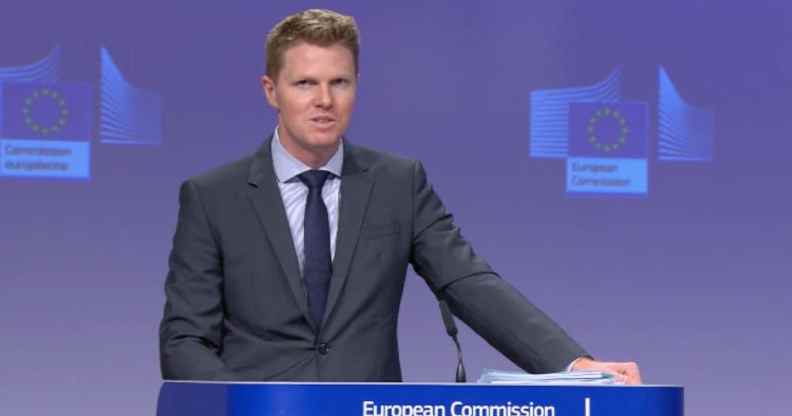EU urged ‘please do something’ after lacklustre response to Hungary’s ‘LGBT+ propaganda’ law

The European Commission’s spokesperson on law and equality, Christian Wigand. (Screen capture via Twitter)
The European Commission has been criticised after one of its representatives spoke of the need for “balance” in regard to Hungary’s reviled ban on the “promotion” of LGBT+ people.
EU commissioners, ministers and MEPs quickly sounded the alarm over the bill, which was passed by the country’s parliament, the National Assembly, in a 157-1 vote on Monday (15 June).
In a last-minute change to an anti-paedophilia bill, government-aligned lawmakers inserted an amendment that bans schools, media and advertisements from “promoting” LGBT+ lives to minors.
The European Commission, the executive arm of the EU, has signalled intentions to impose sanctions on Hungary in retaliation, in a similar vein to Poland.
But activists have called the bloc’s response lacklustre at best, with one human rights experts calling the commission’s spokesperson an “apologist of far-right, homophobic policies”.
During a press briefing Wednesday afternoon (16 June), the commission’s spokesperson on law and equality, Christian Wigand, struck a cautious tone.
Wigand said the commission is “aware” of Hungary’s anti-LGBT+ law and the “national debate” around it, and is looking into it.
“More generally, when protecting children from harmful content, it is important for member states to find the right balance of relevant fundamental rights, such as the freedom of expression and non-discrimination,” he added.
His comment was in contrast to the more emphatic but still vastly symbolic statements from the commission’s bosses.
President Ursula von der Leyen said the bloc is “concerned” and is “assessing if it breaches relevant EU legislation”.
This “regret” was amplified by Didier Reynders, the bloc’s justice commissioner, who said: “No one should be censored.”
EU Commission criticised for ‘lame’ response to Hungary anti-LGBT+ law
The response from the EU toward Hungary drew a firestorm of criticism, with many simply asking: “Please do something.”
Several senior members of the Human Rights Watch, one of the world’s top advocacy groups, voiced their concern about the EU’s apparent inaction. Which included the group’s advocacy director for Europe and Central Asia, Philippe Dam, and its European media director, Andrew Stroehlein.
One senior researcher, Lydia Gall, who specialises in the Western Balkans and eastern Europe, bluntly called the bloc’s response “lame”.
States can "find the rights balance on freedom of expression and non-discrimination"? No, it's about "State should protect freedom of expression and prevent discrimination."
Today is when @EU_Commission's spokesperson becomes apologist of far-right, homophobic policies. https://t.co/kOvRln0D2z
— Philippe Dam (@philippe_dam) June 16, 2021
The "right balance" between demonising a minority and not demonising them?
The "right balance" between protecting #LGBT people from violence & discrimination and not protecting them?
Seriously, @EU_Commission?
Your failure to unequivocally defend human rights is appalling. https://t.co/cXRSCGLszt— Andrew Stroehlein (@astroehlein) June 16, 2021
Can we please discuss this lame response by the @EU_Commission to persecution of #LGBT people in #Hungary? What "right balance"? LGBT children and families need EU institutions to hold ??government to account for failing to protect them from discrimination & violence. ? https://t.co/kyWbatem52— Lydia Gall (@LydsG) June 16, 2021
With this statement, the @EU_Commission validates the premise that erasing LGBTQIA+ people from the public stage has a role in protecting children. This is not just a difference of opinion, it's allowing Hungary to erode our values and human rights in the EU from the inside out. https://t.co/HhrBvYZsH7— Dimitri Van Heucke (@dimitrivh) June 17, 2021
After being permanently concerned, now the EU deeply regrets.
Bottom line: normalization and no action.#LGBTQIA #RuleOfLaw https://t.co/Qq2Nj7Gxai
— Alberto Alemanno (@alemannoEU) June 16, 2021
The European Commission has typically responded to the wave of anti-LGBT+ policies in member states such as Poland with both financial and metaphorical pushback.
It withheld vital funding from Polish regions that have declared themselves “LGBT-free zone” while declaring itself a queer “freedom zone“. Commissioners also last year launched a plan to tackle discrimination, amping up pressure for member states to protect LGBT+ citizens.
But the European Commission is hindered somewhat because its recommendations are not binding on member states. Such legislation must be approved by the European Parliament as well as national governments before it can take action on nations that do not comply.
One avenue it can take, as hinted by von der Leyen, is infringement procedure. A mechanism to suspend certain rights of EU member states if found to breach EU law, such as article seven of the Treaty on European Union, which relates to equality and human dignity.
If enacted, the commission can refer the proceedings to the EU’s Court of Justice which can hand down financial penalties.

